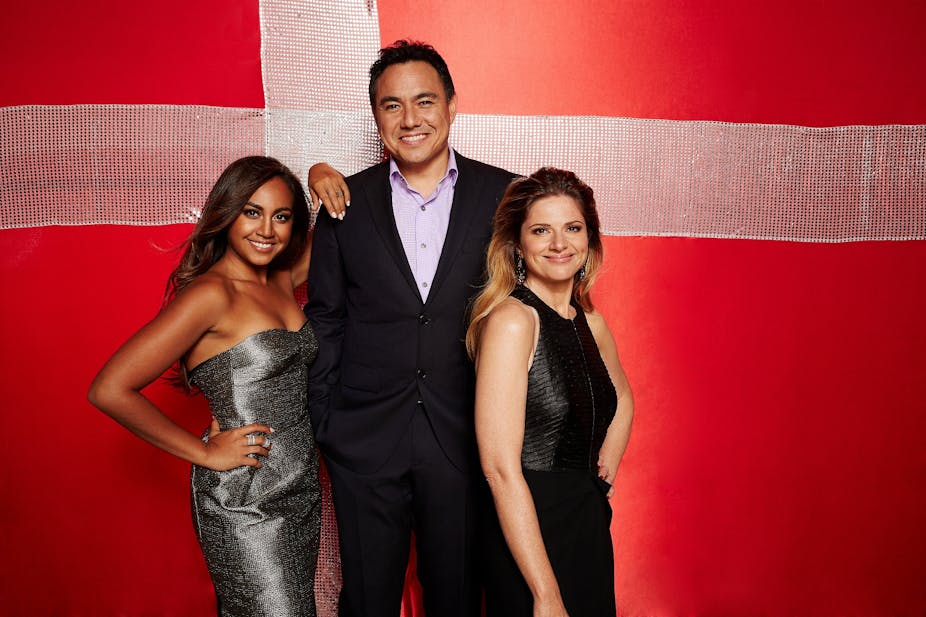And so we wait, anxiously, to see Australia at an event that celebrates the rich cultural tapestry that is the panoply of European states.
Nah, who am I kidding? We’ve got a guernsey at the Eurovision Song Contest, which airs this week on SBS.
Looking at the announcement from this year’s host, Dansk Radio, we Orstraylians have much to be thankful for. As Mikkel Bech, editorial boss for this year’s edition in Copenhagen, recently explained:
Australia is going to take part in the second Semi-Final. They have asked several times if they can take part, because they love the Eurovision Song Contest so much. So this year we have given them permission to take to the stage and show us what they can do.
Now the thing is that I’ve asked my mates – not all admittedly, but a goodly number of them – and none can recall imploring the relevant cultural czar (sorry, poor choice of word now that Vladimir Vladimirovich Putin has shown his hand), that Australia be allowed to appear as a guest at this year’s event.
Thanks to Fairfax media we discovered on Sunday that SBS television wooed the European Broadcasting Union for a year to make it happen, with an eye to ratings as the Australian broadcaster of the event.
But in case you thought Australia had again been annexed by a European power (perish the thought), rather than actually competing, we have been given a “central role” in the semi-final, which takes place on Thursday, local time. A central role that’s kind of like the half-time entertainment at the footy grand final.
In the process, Jessica Mauboy will become the first guest singer from a non-European Union country to perform at Eurovision.
Such munificence is apparently due and just reward for our undying loyalty to the competition ever since ABBA won it with Waterloo in 1974 – which stands to this day as one of the great “what the?” moments in the history of popular entertainment.
Who’s performing for whom?
You’ll have noticed in Bech’s quote, above, that he said:
[…] this year we have given them permission to take to the stage and show us what they can do.
So let’s pause for a minute to consider who the “us” and “they” might be, and what we are expected to “do”.
Why were Australians let into the party? Bech suggests it’s not just because we are a nation of Contest tragics. In an unsettling use of the third person plural, he writes:
Also, many of them have European blood flowing through their veins, so for them it is also a connection to their roots in Europe. I believe that many Australians in one way or another have Europe in them, and many people can relate to the show.
Really? While that may have been the case when a spandex-bedecked ABBA teetered their way into our hearts, it surely is not the case now. SBS, which has long held the Eurovision broadcast rights, might need to alert its European partners to the cultural mélange that is Australia in the 21st century.
In her press comments Jessica Mauboy shows she is acutely aware of the opportunity she has to reach a global audience estimated at around 180 million.
While keeping under wraps any details about the song, she refers to something “very powerful” that will incorporate her “Australian background”. One does wonder what to make of Dansk Radio’s teaser that the presentation will be “big and spectacular, and it is going to involve a lot of humour”.
Hmmm. Peter Vincent from the Sydney Morning Herald recently expressed what are surely the fears of many:
Visions of Australia’s reigning pop queen (and best female ARIA award winner) grinning away in an Akubra and yellow feather boa while surrounded by inflatable kangaroos come to mind. Fluorescent ones perhaps.
But does it matter if she does? No, does it really matter? Does every musician need to emulate the confrontational stance of a Pussy Riot or the posturing of a Midnight Oil?
My answer would be that it depends on the gig that you’ve signed up for.
Put another way, while I’m sure the Ukrainian entry this year might be tempted to put one in the eye of Vlad the Impaler, maybe it’s the SYSTEM that could be questioned. By this I mean that maybe Eurovision is proof positive of the ultimate, if temporary perhaps, victory of what Slavoj Žižek calls the “violence of capitalism”, an apparently systemic violence that has bathed those who enjoy its fruits in beige, and those who resist in blood red.
But this is not Mauboy’s cross to bear. Exposure to an overseas audience of around 30 million souls might bring its own rewards. And her performance, according to SBS director of television Tony Ifflandbut, will be worth “a lot in audience acquisition and that audience is attractive to advertisers”.
Theodor Adorno, Žižek’s long departed ideological fellow traveller, bemoaned the plight of music, like all artforms, in the face of the capitalist juggernaut.
Eurovision has proven him correct – music is a commodity, one that in this case is flashed around on prime-time TV, alongside Maccas and Mercs.
Get used to it.

